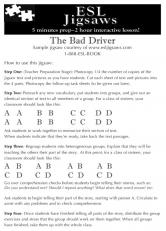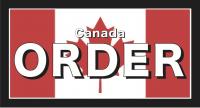ESL Jigsaws
5 Minutes Prep - 2 Hour Interactive Lesson!
Viewing entries tagged with 'intermediate ESL'
Make Canada Study Come Alive
Making your study of Canada for beginner and intermediate ESL come alive is easy with the use of some supplemental materials, like pictures, video and songs. Over the years I have collected about 15 images per province or territory from free Canada calendars, depicting such things as wheat fields, fishing villages, salmon, Douglas Fir trees and igloos that perfectly illustrate aspects of the jigsaws in Callan’s Beginner Canada Jigsaws or Callan’s Canada Jigsaws. I also like to use the video Destination Canada, found in most tourist shops. I show the section of the video related to a given province or territory, either with the sound off and my own narration for lower levels or with the sound on for higher levels.
Charter of Rights and Freedoms
Discussion of the Canadian Charter of Rights and Freedoms can make for an interesting lesson in an intermediate ESL class. Students often assume freedom of expression is the right to say anything about any person or about the government. Here’s where you can let them know about libel laws and Canada’s Hate Speech Laws. Unlike the United States, the Criminal Code of Canada prevents “hate propaganda”. Is this a good thing? Why do we have those laws?
Teaching about Labor / Labour Day
If you are teaching ESL to immigrants or EFL to VISA students and the topic of Labor Day in the United States or Labour Day in Canada comes up, you may find that your students also celebrate a day for workers in their home countries, but that day is usually on May 1st. A national holiday in over 80 countries, May 1st is also celebrated unofficially in many more.
Teaching Food at Higher Levels
If you're like me, you like to teach your food unit during the summer when the grocery stores are full of fresh produce and farmers' markets are in full swing.
Garage Sales & Thrift Stores
It's summer and I'm back on the topic of second hand shopping. If you are teaching English to new immigrants, they may see something as they walk around their neighbourhoods at this time of year that they don't have in their home countries: garage sales. Likewise, they will likely come across thrift stores or flea markets in their neighbourhoods.
Bargaining Language & Soft Skills
Bargaining (or haggling) takes place all over the world. North Americans often think of it as restricted to places like flea markets or garage sales, when in fact bargaining takes place in a wide variety of business transactions. Think of the negotiation involved in the purchase of expensive items, such as cars or real estate.


